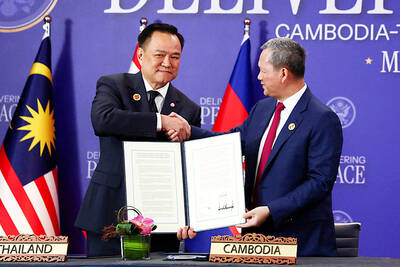More than 1,000 villagers in Inner Mongolia took the local Communist Party chief hostage Thursday in the latest land dispute to rock the Chinese countryside.
Amid signs of division in the government about how to handle rural unrest, the residents of Qianjin village have also driven off hundreds of armed police and blocked construction of a motorway they claim is being built through their crops and homes without adequate compensation.
"About 2,000 protesters have surrounded the local government office," a resident, who declined to give her name, told the reporters by telephone. "They are holding the general secretary and another official."
Another resident, a middle-aged man who gave his surname as Zhang, said this was the first time the village had been in conflict with the police.
"We only want our land and fairness," he said.
The villagers in one of China's poorest provinces say they had been paid only a fraction of the 9,900 yuan (US$1,200) they were promised for each of the 180 mu (about 667 square meters) of land requisitioned for the motorway.
In protest, they halted the work by occupying the building site and seizing construction equipment. Last week, they repelled more than 100 police who had been sent in to empty the site and arrest the ringleaders in a six-hour clash.
"The entire village is in a state of anarchy," Han Guowu, the district chief, told reporters. "Please trust the party and the government," he said. But such pleas are falling on deaf ears as more and more Chinese peasants take matters into their own hands.
The protest in Qianjin is at least the third since April in which locals have fought, and -- at least temporarily -- beaten public security forces.
In June, six peasants were killed in Shengyou, Hebei Province, during a battle with thugs employed by a power company to force them off their land. The government recognized the validity of their dispute, sacked the mayor and promised the villagers that they could keep their property.
Two months earlier, the residents of Huankantou, in Zhejiang Province, fought off more than 1,000 riot police during a protest over a chemical plant.
Countless other demonstrations go unreported. According to the Ta Kung-Pao, a Hong Kong newspaper funded by the government, 3.76 million people took part in 74,000 protests last year.
They are a symptom of China's growing pains as the one-party political system struggles to keep pace with a super-charged economy.
In many areas, public suspicions about official corruption have been rising along with personal expectations that are often left unfulfilled.
The government's response has been mixed. Earlier this month, vice-minister Chen Xiwen condoned the protests as a sign of growing "democratic awareness" among farmers.
In an ominous editorial yesterday, however, the People's Daily warned that any threat to stability would be crushed.
"Destabilizing factors must be resolved at the grassroots and nipped in the bud," the Communist Party organ said.

Shamans in Peru on Monday gathered for an annual New Year’s ritual where they made predictions for the year to come, including illness for US President Donald Trump and the downfall of Venezuelan President Nicolas Maduro. “The United States should prepare itself because Donald Trump will fall seriously ill,” Juan de Dios Garcia proclaimed as he gathered with other shamans on a beach in southern Lima, dressed in traditional Andean ponchos and headdresses, and sprinkling flowers on the sand. The shamans carried large posters of world leaders, over which they crossed swords and burned incense, some of which they stomped on. In this

‘NO COUNTRY BUMPKIN’: The judge rejected arguments that former prime minister Najib Razak was an unwitting victim, saying Najib took steps to protect his position Imprisoned former Malaysian prime minister Najib Razak was yesterday convicted, following a corruption trial tied to multibillion-dollar looting of the 1Malaysia Development Berhad (1MDB) state investment fund. The nation’s high court found Najib, 72, guilty on four counts of abuse of power and 21 charges of money laundering related to more than US$700 million channeled into his personal bank accounts from the 1MDB fund. Najib denied any wrongdoing, and maintained the funds were a political donation from Saudi Arabia and that he had been misled by rogue financiers led by businessman Low Taek Jho. Low, thought to be the scandal’s mastermind, remains

Near the entrance to the Panama Canal, a monument to China’s contributions to the interoceanic waterway was torn down on Saturday night by order of local authorities. The move comes as US President Donald Trump has made threats in the past few months to retake control of the canal, claiming Beijing has too much influence in its operations. In a surprising move that has been criticized by leaders in Panama and China, the mayor’s office of the locality of Arraijan ordered the demolition of the monument built in 2004 to symbolize friendship between the countries. The mayor’s office said in

FIGHTING CONTINUES: Thai military dropped 40 bombs on border areas, Cambodia said, while Bangkok said Phnom Penh launched heavy attacks and damaged homes Cambodia yesterday accused Thailand of intensifying its bombardment of disputed border areas, even as officials from the two countries attend a multi-day meeting aimed at negotiating an end to deadly clashes. The neighbors’ long-standing border conflict reignited this month, shattering an earlier truce and killing more than 40 people, according to official counts. About 1 million people have also been displaced. Cambodian and Thai officials were in their third day of talks at a border checkpoint, with ministers of defense from the two countries scheduled to meet today. However, the Cambodian Ministry of National Defense said Thailand’s military carried out a heavy